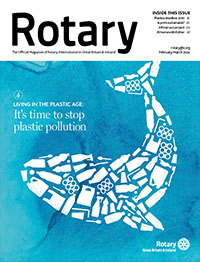A freezing winter, Covid moving us to tiers, declining membership numbers. Not much reason for optimism, is there? Actually, there is.
The pandemic has seen many people volunteering who haven’t done so before – a potential pool of new Rotarians.
However much we might by now be getting bored with Zoom, Rotarians have adapted well to not meeting face-to-face, and there is every chance that when we get back to “normal”, many clubs will mix and match their meeting arrangements.
This will make those clubs less daunting to someone who finds Rotary attractive, but struggles with the time and cost pressures that the weekly meal-meeting imposes.
Our opportunity to get involved in supporting mass testing and mass vaccination programmes gives us a great opportunity to remind people that we are people of action.
The pandemic has seen many people volunteering who haven’t done so before – a potential pool of new Rotarians.”
But we need to do more.
Districts and Rotary in Great Britain & Ireland need to be more focused on growing Rotary.
With declining numbers and an ageing membership, many districts struggle to fill all the posts they’re supposed to, and district governors are therefore distracted from their key job of leading their district.
Moreover, Rotary GB&I has long been hampered by having an unwieldy governing body of 31 members – at least 26 of whom change every year – that’s no way to run a business.
This continual churn of members makes it difficult for the governing body to take a long-term strategic approach to addressing Rotary’s problems.
Districts and Rotary in Great Britain & Ireland need to be more focused on growing Rotary.”
This year, the Governing Council has been addressing both these issues.
It has been discussing how neighbouring districts can work together, maximizing the effective use of the talents of district officers, and freeing up district governors to concentrate on renewing Rotary in these islands – starting new clubs to attract a younger generation of new Rotarians, while still helping traditional clubs to grow.
Some districts are already working together to run multi-district presidents-elect training, so we should see this collaboration start to develop from the beginning of the new Rotary year in July.
Governing Council has also agreed to reform itself by changing it from being largely composed of serving district governors to a much smaller body, comprising Rotarians with relevant skills, experience and background, who will each serve for a three-year term – thus ending the frustrating annuality of the current arrangements.
The Rotary GB&I bylaws, however, need to be changed for this to be brought about, so Governing Council will be bringing forward the necessary resolutions to the Business Meeting on May 21st.
These may be difficult times, but they are also exciting times. The reforms which Governing Council has been considering open up opportunities for us to renew and rejuvenate Rotary in Great Britain and Ireland.
Now it’s up to us all to deliver!



























































